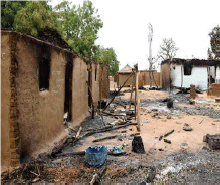By TIMOTHY JOSEPH
THE incessant killings in Plateau State have turned the state into a hotbed of violence, leaving families shattered and communities fractured. The brutal cycle of unprovoked attacks has devastated the economic well-being of the people and hindered the state’s developmental prospects.
One of the major concerns raised by these senseless killings is the failure of security operatives to adequately protect lives and property. The recurring nature of these attacks points to lapses in intelligence gathering, coordination and timely response.
For i nstance, on Tuesday, July 15, 2025, suspected Fulani herdsmen attacked Tahoo village in Riyom Local Government Area, killing 27 innocent citizens. This massacre happened despite the presence of military operatives under Operation Safe Haven, stationed barely 200 meters from the community. Early warning signs and intelligence reports had indicated an imminent threat, making the attack tragic, and avoidable.
A governor’s response, public reassurance
While addressing affected residents in Riyom, an openly miffed Governor Caleb Mutfwang condemned the killings in strong terms and assured citizens of his administration’s commitment to their safety.
“By the grace of God, Riyom will not fall. We will deploy every resource at our disposal to end this genocide. This is not a case of farmers and herders conflict, this is terrorism, plain and simple,” the governor declared.
Mutfwang acknowledged the efforts of gallant soldiers defending Plateau communities but noted that some “bad elements” within security agencies must be identified and removed. He assured residents that government would organize a dignified burial for victims and emphasized that unlike in the past, his administration would not look away from the people’s pain.
Bloody footprints across the Plateau
Since April 2025, assailants, most of them suspected to be Fulani herdsmen, have left footprints of blood and tears across Plateau State, striking communities indiscriminately. Some of the most devastating incidents include:
April 2, 2025 -S uspected Fulani herdsmen attacked Manguno, Josho and Daffo in Bokkos LGA, killing several and razing homes.
April 14, 2025 – Zike Hamlet, Kimakpa community, Bassa LGA, was attacked by suspected Fulani herdsmen, leaving 45 dead and 30 houses burnt.
June 20, 2025 – Fulani militia attacked Jwan (Bokkos LGA) and Chakfem (Mangu LGA), killing 19.
July 14, 2025 – Armed herders stormed Jebu village in Riyom LGA, killing at least 20, including women and children.
July 17, 2025-Women and children returning from Bokkos market were ambushed and slaughtered in Chirang, Mangor, Bokkos LGA.
August 18, 2025 – Five people were killed in Tim village, Mangu LGA, when gunmen suspected to be Fulani herdsmen attacked at 4 p.m., setting houses ablaze.
These, among many other, atrocities, which stretch from Riyom to Bassa, Bokkos and Mangu, suggest a deliberate and systematic pattern of ethnic cleansing and land grabbing rather than isolated clashes.
Beyond promises: Need for justice
Despite repeated assurances, Nigerians have grown weary of security agencies’ stock, mostly empty, phrases: “We are on top of the situation,” “We will bring them to justice.” Such rhetoric has done little to stem the tide of bloodshed.
The Nigerian state risks becoming an undertaker in the eyes of its citizens if it fails to act decisively. Security agencies must abandon excuses, investigate thoroughly and bring perpetrators to justice. The judiciary also has a critical role to play in prosecuting these clear cases of unprovoked brutality and genocide-related crimes being perpetrated against Plateau’s ethnic nationalities.
Civil society, traditional leaders, vigilante groups and the media must also work together to put pressure on authorities and keep government accountable. Public confidence will only be restored when investigations are transparent and punishment is carried out without bias.
Conclusion
The killings on the Plateau have created an atmosphere of fear, doubt and loss. Yet, Plateau State has immense potential for growth and prosperity if peace and stability are restored. The partnersh i p being considered between the Plateau State House of Assembly and conventional security agencies to develop new strategies against the killings is a step in the right direction and should be commended by all peace-loving Nigerians.
But words must now give way to action. Enough tears have been shed. Enough promises have been made. It is time to end the bloodbath and secure Plateau’s future.
Joseph is of the Ministry of Information and Communication, Joseph Gomwalk Secretariat, Jos



